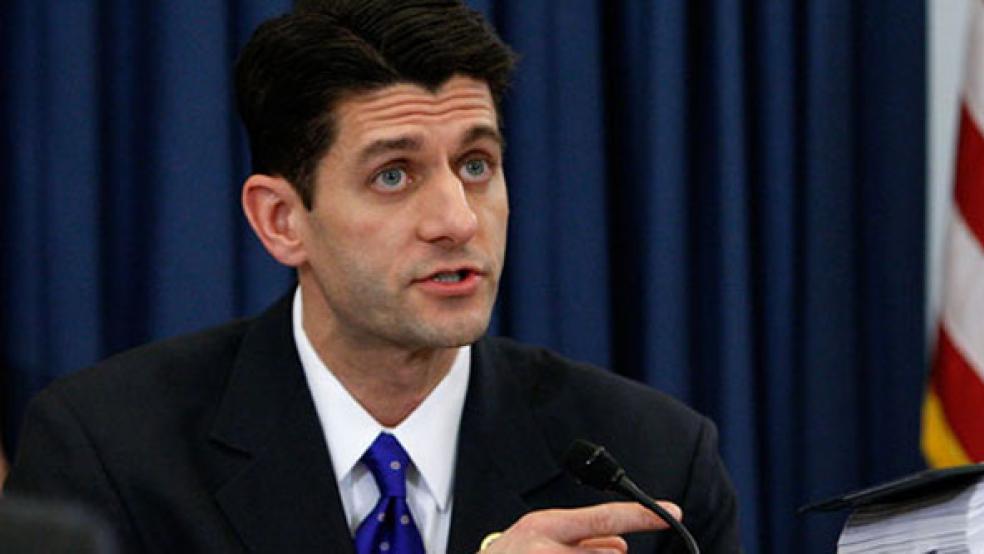As part of the general effort among Republicans in Washington to prevent President Obama’s focus on inequality from painting them as the party of plutocrats, Rep. Paul Ryan appeared at the Brookings Institution this week to talk about poverty.
The Wisconsin Republican and 2012 vice-presidential nominee discussed how the poor could be “reintegrated” into society, and as part of his speech, he proposed that the United States consider adopting a “Universal Credit” scheme that would both streamline the various social safety net payments and tax credits the poor receive and, rather than cutting off abruptly when recipients cross a certain income threshold, would taper off as income rises, thereby reducing the disincentive to finding work .
Related: Top Problem for Americans Now – the U.S. Government
To be clear, Ryan has not suddenly changed his mind about the need to cut entitlement costs. He firmly believes that the U.S. is spending itself into economic oblivion and that the main drivers of the problem are our healthcare and entitlement programs. What’s happening here is that Ryan, having taken a couple of runs at entitlement reform, with no success, is changing his approach.
His series of budget proposals over the past several years, one of which memorably described the social safety net as a “hammock” in which the unemployed lounge, have all contemplated serious cuts to benefits programs. But none of them were enacted, and all of them earned him copious obloquy from the left. Popular liberal blogger Charlie Pierce, for example, always refers to Ryan as “the zombie-eyed granny-starver from Wisconsin.”
By advocating a Universal Credit benefit system, Ryan is taking a much smarter approach to his ultimate goal of reducing what we spend on entitlements - one in which spending cuts aren’t his first order of business.
The fact is that the system under which Americans apply for and receive government benefits is extremely complex and wasteful. A recent Fiscal Times article, for example, pointed out that just a handful of programs waste more than $100 billion a year by making payments that are later determined to have been inappropriate.
Related: $1 Trillion Spending Bill Splits Winners and Losers
Streamlining the system so that agencies could communicate better would go a long way toward preventing “double-dipping” and other problems that result in improper payments.
It would also, arguably, make the lives of benefits recipients better. Not only would they be spared the effort of trying to coordinate their benefits through multiple federal agencies, they would find it easier to ease back into work if the plan were implemented as Ryan suggested.
Ryan cited work done by economist Gene Steuerle, who has pointed out that current policies that abruptly strip recipients of their government benefits when they find work or reach a certain level of income, have the same effect as drastically raising their marginal tax rates and create disincentives to work.
“According to Steuerle’s calculations, if she’s enrolled in programs like food stamps, Medicaid, and SCHIP, her implicit marginal tax rate will be as high as 55 percent,” Ryan said. “And if she’s enrolled in other programs—like housing assistance and welfare—the rate will reach above 80 percent. In other words, go to work, and you’ll keep less than 20 cents of every extra dollar you earn.”
Related: Get Ready for One-Party Rule If the GOP Wins the Senate
Ryan’s proposal is serious and thoughtful. And it will likely never happen, for at least two reasons.
The first is that, much as we don’t like to admit it, we have a strong tradition of paternalism in this country – at least when it comes to social benefits. It would be vastly simpler and cheaper to write a check to food stamp recipients, instead of creating and issuing specific cards just for the program. But the current system allows the government to restrict the kinds of things recipients buy with their benefits. Section 8 housing benefits and other programs have similar controls in place.
Given the general animosity toward entitlement benefit recipients among a large segment of the voting public – including much of Ryan’s base – the likelihood of passing legislation that would increase the freedom of benefits recipients to spend money as they see fit is virtually nil.
The second reason is that restructuring the social safety net in the fashion Ryan suggests would necessitate a massive initial outlay of federal funds to pay for an enormous, technologically complex system that would reach into the lives of virtually every American. Sound familiar? The experience of Obamacare’s terrible rollout hasn’t exactly left the public clamoring for another major government-led IT project.
Related: Feds Blow $100 Billion Annually on Incorrect Payments
For Ryan, though, the likely failure of the universal credit probably doesn’t matter, at least in terms of meeting his long-term goal of reducing what we spend on entitlement programs. This proposal gives him a path into the discussion of entitlement reform that doesn’t immediately set Democrats’ teeth on edge with the promise of benefit cuts, while still giving him the opportunity to highlight the real and expensive inefficiencies that plague the system.
The worst-case scenario for Ryan is that his proposal dies, and nobody remembers it. No harm, no foul. But even if he gets just a little traction, and starts a discussion of the fact our entitlements system is inefficient, expensive, and could do a much better job of serving the people it is supposed to help, it sets Ryan up as a player in the debate whose sole priority is not slashing benefits, even though cutting spending remains his primary goal.
Follow Rob Garver on Twitter: @rrgarver
Top Reads from The Fiscal Times:





